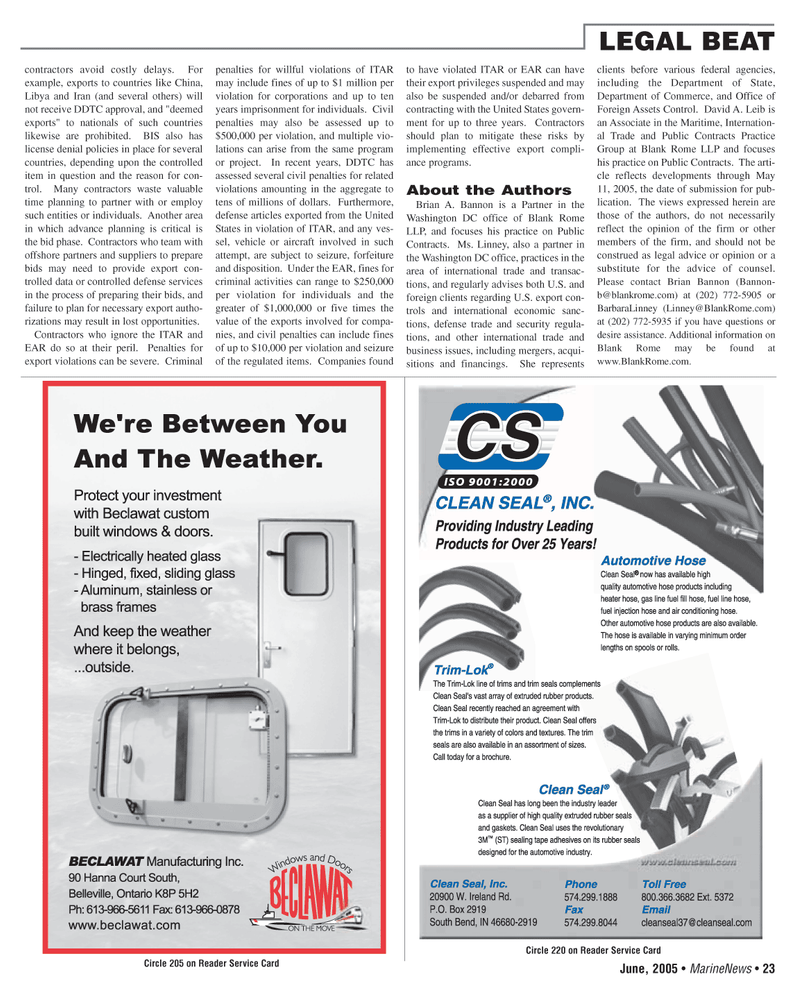
Page 23: of Marine News Magazine (June 2005)
Read this page in Pdf, Flash or Html5 edition of June 2005 Marine News Magazine
June, 2005 • MarineNews 23
Circle 205 on Reader Service Card contractors avoid costly delays. For example, exports to countries like China,
Libya and Iran (and several others) will not receive DDTC approval, and "deemed exports" to nationals of such countries likewise are prohibited. BIS also has license denial policies in place for several countries, depending upon the controlled item in question and the reason for con- trol. Many contractors waste valuable time planning to partner with or employ such entities or individuals. Another area in which advance planning is critical is the bid phase. Contractors who team with offshore partners and suppliers to prepare bids may need to provide export con- trolled data or controlled defense services in the process of preparing their bids, and failure to plan for necessary export autho- rizations may result in lost opportunities.
Contractors who ignore the ITAR and
EAR do so at their peril. Penalties for export violations can be severe. Criminal penalties for willful violations of ITAR may include fines of up to $1 million per violation for corporations and up to ten years imprisonment for individuals. Civil penalties may also be assessed up to $500,000 per violation, and multiple vio- lations can arise from the same program or project. In recent years, DDTC has assessed several civil penalties for related violations amounting in the aggregate to tens of millions of dollars. Furthermore, defense articles exported from the United
States in violation of ITAR, and any ves- sel, vehicle or aircraft involved in such attempt, are subject to seizure, forfeiture and disposition. Under the EAR, fines for criminal activities can range to $250,000 per violation for individuals and the greater of $1,000,000 or five times the value of the exports involved for compa- nies, and civil penalties can include fines of up to $10,000 per violation and seizure of the regulated items. Companies found to have violated ITAR or EAR can have their export privileges suspended and may also be suspended and/or debarred from contracting with the United States govern- ment for up to three years. Contractors should plan to mitigate these risks by implementing effective export compli- ance programs.
About the Authors
Brian A. Bannon is a Partner in the
Washington DC office of Blank Rome
LLP, and focuses his practice on Public
Contracts. Ms. Linney, also a partner in the Washington DC office, practices in the area of international trade and transac- tions, and regularly advises both U.S. and foreign clients regarding U.S. export con- trols and international economic sanc- tions, defense trade and security regula- tions, and other international trade and business issues, including mergers, acqui- sitions and financings. She represents clients before various federal agencies, including the Department of State,
Department of Commerce, and Office of
Foreign Assets Control. David A. Leib is an Associate in the Maritime, Internation- al Trade and Public Contracts Practice
Group at Blank Rome LLP and focuses his practice on Public Contracts. The arti- cle reflects developments through May 11, 2005, the date of submission for pub- lication. The views expressed herein are those of the authors, do not necessarily reflect the opinion of the firm or other members of the firm, and should not be construed as legal advice or opinion or a substitute for the advice of counsel.
Please contact Brian Bannon (Bannon- [email protected]) at (202) 772-5905 or
BarbaraLinney ([email protected]) at (202) 772-5935 if you have questions or desire assistance. Additional information on
Blank Rome may be found at www.BlankRome.com.
LEGAL BEAT
Circle 220 on Reader Service Card
JUNEMN2005 3(17-24)saved3.qxd 5/27/2005 11:53 AM Page 23

 22
22

 24
24
